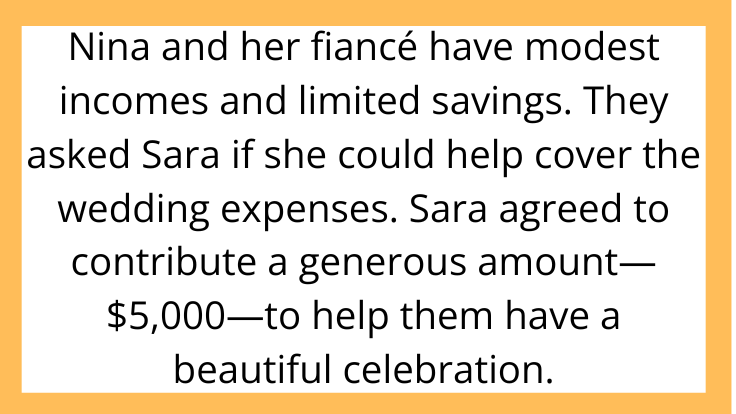AITAH for Refusing to Pay for My Sister’s Wedding When She Called Me Cheap for Setting a Budget?
When it comes to family weddings, money can turn even the closest relationships into battlegrounds. In this AITAH-inspired scenario, we look at what happens when generosity collides with entitlement—and whether setting limits makes you the villain.
The Backstory: A Gift or an Obligation?

A 34-year-old woman—let’s call her Sara—shared her story on r/AITAH. Sara is the oldest sibling in her family and has always been the one people turned to for help. Over the years, she lent her parents money, paid for her brother’s college textbooks, and covered emergency bills without complaint.
Recently, Sara’s younger sister, Nina, got engaged. The family was overjoyed—until money entered the conversation.
Nina and her fiancé have modest incomes and limited savings. They asked Sara if she could help cover the wedding expenses. Sara agreed to contribute a generous amount—$5,000—to help them have a beautiful celebration.
But when Sara mentioned she’d set a budget and couldn’t cover more, Nina called her cheap and unsupportive.
Setting Boundaries: When Generosity Isn’t Enough

Sara explained in her post that she wanted to help but also needed to protect her own finances. She’s saving for a down payment on a home and working hard to pay off her student loans. She felt $5,000 was a significant gift—especially considering she’d already helped her sister financially many times before.
Nina disagreed. She insisted Sara could “easily afford” to pay more, pointing out that Sara earns more than anyone else in the family. She accused Sara of caring more about her bank account than her sister’s happiness.
Feeling hurt and frustrated, Sara stood firm on her budget. She offered to pay vendors directly to prevent any misunderstandings but made it clear she would not increase her contribution.
Family Reactions: Divided Loyalties

Sara’s parents sided with Nina. They called Sara “stingy” and argued that family is supposed to support each other no matter what. Her mother even suggested Sara’s success was meaningless if she wasn’t willing to share it.
Some relatives agreed. Others told Sara she had already done more than enough and was being taken advantage of.
Sara turned to Reddit to ask: Am I the villain for refusing to pay for the entire wedding and insisting on a budget?
The Case for Sara: Protecting Her Future

Many Reddit users rushed to defend Sara.
“You’re not an ATM,” one commenter wrote. “Being successful doesn’t mean you owe everyone unlimited support.”
Others pointed out that weddings are not emergencies. They’re optional celebrations, and no one is entitled to a lavish event at someone else’s expense.
Sara’s decision to contribute a clear, fixed amount shows she wanted to help—but not at the cost of her own goals.
The Case for Nina: A Sense of Entitlement or a Cry for Help?

A smaller group sympathized with Nina, suggesting her reaction came from stress. Weddings are expensive, and financial struggles can make emotions run high.
However, even these commenters agreed that Nina’s response—name-calling and guilt-tripping—was unfair.
“It’s one thing to ask for help,” one user commented, “and another to demand it.”
Lessons Learned: Money, Boundaries, and Family

Helping vs. Enabling
Sara’s story highlights a critical distinction: generosity is voluntary. When someone demands more than you can give—or tries to shame you—it crosses the line from helping to enabling entitlement.
Setting boundaries doesn’t make you selfish. It makes you responsible.
The Importance of Clear Communication
One of the most common conflicts around money is lack of clarity. Sara was wise to specify exactly how much she could contribute. Clear terms protect relationships from resentment later on.
How Could Sara Handle This Moving Forward?
Here are some tips for anyone in Sara’s shoes:
-
Communicate early and clearly about what you can offer.
-
Offer alternatives, like paying specific vendors or covering one part of the celebration.
-
Avoid guilt—no one gets to dictate how you spend your money.
-
Stay calm and consistent when faced with emotional reactions.
The Verdict: Not the Villain

Most readers agreed Sara was not the villain. She gave a generous gift while maintaining healthy boundaries. Nina’s disappointment doesn’t justify insults or entitlement.



